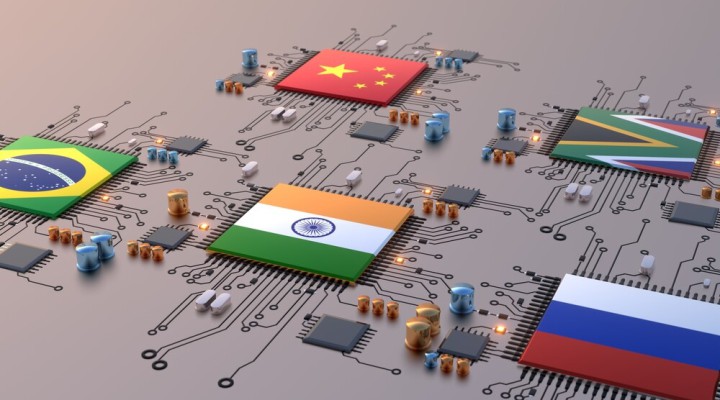Russia and Brics: A New Multilateralism

Western perceptions of Russia remain married to beliefs founded in a reality that has not existed for nearly a quarter of a century. In the decade following the collapse of the Soviet Union, Western political and economic interests engaged in a concerted effort to transform Russia into something more reflective of Western intent, and less so Russian reality. But the 1990s have been relegated to the pages of history. Russia itself has moved on. This is evident in Moscow’s leadership position on the Brics forum, which is pitting a new focus on multilateralism against the US-backed, rules-based international order.
Some Western analysts seem confused by Russia’s role in Brics, constructing notions of a clash between a “Russia first” policy and the precepts involved in building “a new world order,” while questioning whether Moscow is capable of balancing foreign and domestic priorities simultaneously. But there is no separation between the two.
Russia will play host to the Brics forum in October, with delegations from member states, countries seeking membership and others curious about the role Brics will play in their future converging on the ancient city of Kazan in Tatarstan. The group expanded from its original core five members (Brazil, Russia, India, China and South Africa) during last year’s summit in South Africa by inviting five new members — Egypt, Saudi Arabia, Iran, the United Arab Emirates and Ethiopia (a sixth add-on, Argentina, subsequently withdrew). Brics, which this year is under Russian chairmanship, is expected to continue its expansion.
The Road to Kazan
The Kazan gathering will not happen in a vacuum. Significant preparations are taking place under the direction of the Russian government to establish agenda priorities, create institutional frameworks and build consensus among existing Brics members, prospective members and other interested parties on prospective policies expected to emerge from the summit.
Whereas last year’s South African summit had as its central theme the issue of expansion, the Kazan summit appears likely to aim to transform Brics into a multilateral institution designed to compete with, and eventually replace, the US-dominated, rules-based international order, which serves as the foundational organizing principle for organizations such as the G7, Nato and the European Union. These are viewed by Russia and China not just as competitors but, increasingly, as adversaries.
The logical springboard for the summit is the St. Petersburg International Economic Forum (SPIEF), an annual gathering of world political and economic leaders that hosted more than 25,000 attendees. As with any international gathering of this scope and scale, the lead-up involved numerous pre-conferences and diplomatic meetings where agendas were discussed, and preparations made regarding anticipated outcomes from both SPIEF and Brics.
Russia, with China, is seeking to expand the membership of Brics. India has in the past expressed some hesitation in supporting this objective, given concerns that this will dilute its influence on the Brics agenda. However, with invitations being extended to Serbia (by China) and Bahrain (by Russia), and with Turkey indicating it is considering joining, it appears that a new round of expansion is in the works.
Russian President Vladimir Putin, together with Foreign Affairs Minister Sergei Lavrov, has been shaping the Brics summit, including building support for strengthening economic interaction within the group. “De-dollarization” — or finding international alternatives to the US dollar — is expected to be high on the agenda. India’s Reliance Industries’ agreement of a one-year deal with Russia’s Rosneft to buy at least 3 million barrels of oil per month in rubles stands out as an example.
Russia will also play host to another important forum, the Moscow International Security Conference (MISC), in mid-August. Like SPIEF, the event has embraced the theme of multipolarity, focusing on issues such as conflicts in the Middle East and Africa, military cooperation in Asia-Pacific and new international security architectures in the Global South. MISC assiduously avoids the conflict in Ukraine — but the issue is ever present, hovering in the background.
Significantly, China and the other Brics nations are not aligning against Russia on the issue of Ukraine, despite considerable pressure from the US. While Brics as an organization is not in a position to provide a green light for Russian and Chinese military operations, the fact that it is expanding at a time when its two most influential members are not shying away from conflict, in Ukraine and Taiwan, implies an institutional neutrality.
Expanded Scope
Since the meeting between Putin and his Chinese counterpart, Xi Jinping, in Beijing in February 2022, where the two signed a joint statement pledging to promote a new “law-based” international order over its Western “rules-based” counterpart, these two nations have been engaged in a campaign to promote multilateralism over US-centric hegemony. Brics was always considered a tool in this regard.
Since the 2023 South Africa Summit, Brics has been on a trajectory of significant change in terms of both composition and mission. Under Russian leadership, the Brics 2024 summit appears poised to try to dramatically expand the scope and scale of Brics’ mission-oriented functionality, centering on the transformation of the world order away from a US-dominated, rules-based system toward a new multilateralism, and turning a forum that what was once largely ignored by the West as little more than a minor geopolitical distraction into a global game-changer. Brics is moving from being an institution defined largely by its potential, to one that is setting the pace for global economic and geopolitical change.
https://www.energyintel.com/00000190-0602-d824-a7d5-573e59070000
 TheAltWorld
TheAltWorld 
0 thoughts on “Russia and Brics: A New Multilateralism”